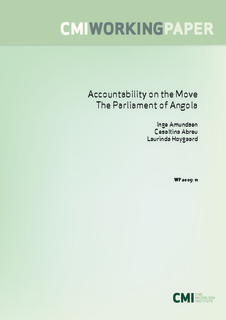| dc.contributor.author | Amundsen, Inge | |
| dc.contributor.author | Abreu, Cesaltina | |
| dc.contributor.author | Hoygaard, Laurinda | |
| dc.date.accessioned | 2008-02-20T12:54:00Z | |
| dc.date.accessioned | 2017-03-29T09:13:06Z | |
| dc.date.available | 2008-02-20T12:54:00Z | |
| dc.date.available | 2017-03-29T09:13:06Z | |
| dc.date.issued | 2005 | |
| dc.identifier.isbn | 82-8062-121-0 | |
| dc.identifier.issn | 0804-3639 | |
| dc.identifier.uri | http://hdl.handle.net/11250/2436029 | |
| dc.description.abstract | The Parliament of Angola was established and elected in 1992 in a watershed election that coincided with the peace process in Angola and the democratisation process in much of Africa. There has still been no second election, which means that this parliament is now working on a feeble legal basis. This study explores the strengths and weaknesses of the Angolan Parliament. It demonstrates that the Angolan Parliament is very weak in terms of its constitutional mandate, mainly because it is operating within a strong presidential system. It is also weak in terms of resource allocations and working conditions, because the ruling party is so dominant. Despite this, a slow and uneven process of increased parliamentary power for possible checks and balances is just beginning. | |
| dc.language.iso | eng | |
| dc.publisher | Chr. Michelsen Institute | |
| dc.relation.ispartofseries | CMI Working paper | |
| dc.relation.ispartofseries | WP 2005: 11 | |
| dc.subject | Democratization | |
| dc.subject | Parliament | |
| dc.subject | Constitutions | |
| dc.subject | Political parties | |
| dc.subject | Angola | |
| dc.title | Accountability on the Move. The Parliament of Angola | |
| dc.type | Working paper | |
